New Report Helps UK MCA Prepare for Offshore Oil Spill Challenges
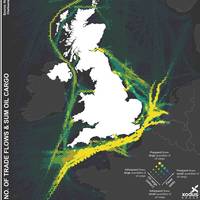
The UK Maritime and Coastguard Agency's (MCA) future oil spill response plan will be informed by a new report that maps out possible threats to the UK's coastal areas, marine life, and traffic as a result of hydrocarbon releases from energy industry operation and shipping.The report on the review of the hydrocarbon release risk on the UKCS over the next decade was delivered for the MCA, by Xodus Group, in association with London Marine Consultants.The review evaluated the risk of a serious mineral oil release occurring in UK waters from vessels of more than 1…
600 Gallons of Coolant Spills into Straits of Mackinac
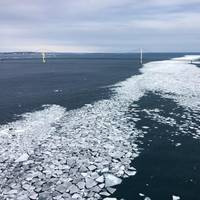
Hundreds of gallons of mineral oil has been released from a leaking underwater utility line in Michigan’s Straits of Mackinac, this week. Initial reports from the responsible party, American Transmission Company (ATC), indicate that approximately 600 gallons of product has been released, with maximum spill potential of more than 4,000 gallons. The U.S. Coast Guard said it has established a Unified Command comprised of Michigan Department of Environmental Quality, county emergency managers, local tribes, the National Oceanographic and Atmospheric Administration, U.S.
Salvage and Marine Firefighting Verification
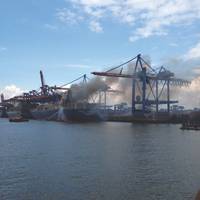
The U.S. Coast Guard regulations regarding salvage and marine firefighting (SMFF) as elements of vessel response plans (VRPs) for tank vessels have been in place since December 31, 2008. On September 30, 2013, these regulations were expanded to include non-tank vessels with a capacity of 2,500 barrels or greater of fuel oil. The VRP requirement was established by the Oil Pollution Act of 1990 (OPA 90). be resubmitted for approval of each significant change. The salvage and marine…
BSEE Evaluates Oil Spill Response Exercise
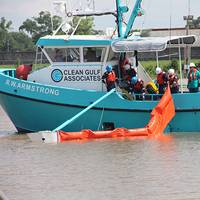
Engineers and analysts from the Bureau of Safety and Environmental Enforcement's (BSEE) Gulf of Mexico and Alaska Regions recently evaluated Spill Response Operations Training and Equipment Verification exercises conducted by the Tennessee Gas Pipeline Company and its oil spill removal contractor at the Port of Morgan City, La. These exercises are required periodically to test spill response team training and resource availability, as part of each operator’s Oil Spill Response Plan.
Commandant Discusses Coast Guard’s Role in the Arctic
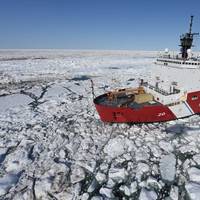
U.S. Coast Guard Commandant, Adm. Paul Zukunft presented at last week’s 6th Symposium on the Impacts of an Ice-Diminishing Arctic on Naval and Maritime Operations in Washington, DC. Summarizing Adm. In my role as the Commandant of the Coast Guard, I view the Coast Guard as the lead federal maritime agency when it comes to all things Arctic. By “all things Arctic,” I mean everything from safety of life at sea, to marine environmental protection, to fisheries enforcement and a whole host of Coast Guard missions. They all reside within one service, the United States Coast Guard.
Insights: Steven Candito, President & CEO, NRC

This month’s featured INSIGHTS executive is Steven A. Candito, President and CEO of the National Response Corporation (NRC). He has extensive experience with OPA 90 compliance issues with particular focus on vessel owner and insurance matters. Candito was previously an attorney with Haight Gardner Poor & Havens, specializing in maritime litigation and environmental law. He also served as a marine engineer aboard Exxon USA’s domestic tanker fleet from 1980 to 1985. Candito is a graduate of Hofstra University School of Law and the United States Merchant Marine Academy.
EPA Proposes Changes to Oil Spill Response Plan

The U.S. Environmental Protection Agency (EPA) is proposing to amend requirements under the National Oil and Hazardous Substances Pollution Contingency Plan (NCP) to improve the nation’s ability to plan for and respond to oil spills. This proposal addresses issues raised by the public, responders, government, and industry officials during the 2010 Deepwater Horizon Oil Spill. “Our emergency officials need the best available science and safety information to make informed spill response decisions when evaluating the use of specific products on oil discharges…
BSEE Conducts Oil Spill Response Equipment Review
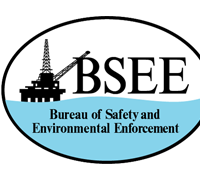
Earlier this week, BSEE's Oil Spill Response Division (OSRD) conducted an onsite review of oil spill response equipment listed in DCOR, LLC's Oil Spill Response Plan for platforms offshore Long Beach, Calif. The visit included verification of equipment and response vessels maintained by Marine Spill Response Corporation. OSRD verifies the equipment listed in each operator's plan on a rotating basis in addition to reviewing maintenance and training records. BSEE oversees oil spill planning and preparedness for U.S.
Allianz: Shipping Losses Decline but Risks Remain

Shipping losses decline, but emerging risks pose serious challenges to marine industry, according to Allianz study. 94 large ships lost worldwide in 2013, down 20% from last year. Total ship losses in continental U.S. hits all time low. Piracy focus shifts away from Somalia to new hotspots. “Mega ships”, Arctic shipping and alternative fuels create new industry risks. Shipping losses continued their downward trend with 94 losses reported worldwide in 2013, coming in below 100 for only the second time in 12 years…
Nontank VRP Regs
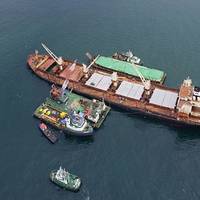
The clock is ticking toward the deadline to submit to the U.S. Coast Guard an oil spill response plan that meets the requirements of the NTVRP regulation. The long-awaited nontank vessel response plan (NTVRP) rulemaking was published on September 30, 2013 and came into effect on October 30, 2013. Neither of these are significant dates for the owners, operators, and masters of nontank vessels operating on the navigable waters of the United States. The truly significant date is January 30, 2014.
Hong Kong Conducts Oil Spill Exercise
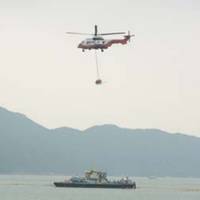
An annual oil spill response joint exercise, this year code-named Oilex 2013, was held on October 17 off Ha Mei Wan, Lamma Island, to test responses in combating oil pollution in Hong Kong waters. Under the Maritime Oil Spill Response Plan, the Marine Department coordinated the exercise and other government departments including the Civil Aid Service, the Auxiliary Medical Service, the Food and Environmental Hygiene Department, the Government Flying Service (GFS) and the Hong Kong Police Force participated. Several oil companies and Hong Kong Response Limited also took part in the exercise.
Leading Industry towards Offshore Excellence

Working offshore can be dangerous business. Miles from shore with nothing but water in all directions, offshore crews perform highly complex operations with little margin for error, and the potential for severe consequences if something goes wrong. We were reminded of this just a few weeks ago, when an explosion and fire aboard a shallow-water production platform offshore Louisiana on November 16 resulted in the tragic deaths of two confirmed crewmembers and severe injuries to many others.
Arctic Greenpeace Activists Board Drilling Platform
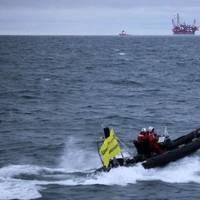
Greenpeace personnel board Russia's Gazprom Prirazlomnaya platform in the Pechora Sea. The activists aim at disrupting the platform’s operation and bring focus on climate change in the Arctic. The activists set off in three inflatable speedboats from the Greenpeace ship "Arctic Sunrise" and scaled the platform via mooring lines. Six climbers have taken up positions on the structure and claim to have interrupted the platform's operations. Greenpeace say their people are out of reach and have enough supplies to last them for several days.
BSEE: Unannounced Spill Drill to Test Subsea Containment Response
The Bureau of Safety and Environmental Enforcement (BSEE) has completed the first unannounced oil spill drill since the reorganization of the former Minerals Management Service was completed on Oct. 1. The table-top drill, which took place last week, was led jointly by BSEE in conjunction with the U.S. Coast Guard and the State of Louisiana and tested Stone Energy Corporation’s ability to assess a subsea well control situation and mobilize the proper subsea containment/intervention equipment in a timely manner. A final evaluation will follow when analysis of all documentation is completed. “The Unannounced Spill Drill Program provides…
BOEMRE on Resuming Pre-Approved Activities
The Bureau of Ocean Energy Management, Regulation and Enforcement (BOEMRE) notified 13 companies whose deepwater drilling activities were suspended by last year’s deepwater drilling moratorium that they may be able to resume those previously-approved activities without the need to submit revised exploration or development plans for supplemental National Environmental Policy Act (NEPA) reviews. Before resuming those activities without additional NEPA review, however, the companies must comply with BOEMRE’s new policies and regulations. “Going forward, we are substantially enhancing our environmental reviews and analysis under NEPA,” said BOEMRE Director Michael R. Bromwich.
20th Anniversary of Oil Spill Drill Program
Minerals Management Service (MMS) Director Liz Birnbaum today highlighted the 20th anniversary of the MMS Gulf of Mexico Region’s Unannounced Oil Spill Drill Program. The first unannounced drill with an offshore oil and gas operator in the Gulf was held on July 25, 1989. Since the first unannounced drill, an additional 273 drills have been held in the Gulf. The MMS designs the drill to exercise an oil and gas and pipeline operator’s Oil Spill Response Plan and evaluates its spill management team’s effectiveness in responding to a simulated spill event. “While preventing oil spills is our top priority throughout the offshore energy exploration and extraction process, operators must be ready to respond to a spill event,” Birnbaum said.
Nontank Vessel Oil Spill Response Plan Guidance
The U.S. Coast Guard issued a Notice announcing the availability of interim guidelines for the development and review of plans for responding to a discharge, or threat of a discharge, of oil from nontank vessels. The guidance, Navigation and Vessel Inspection Circular (NVIC) 01-05, applies to all self-propelled vessels of 400 gross tons or greater, other than tank vessels, that carry oil of any kind as fuel for main propulsion and that are either vessels of the United States or foreign vessels operating on U.S. navigable waters (internal waters or within the 3-nm territorial sea). Tonnage is measured in accordance with the International Tonnage Convention (ITC). 70 Fed. Reg. 7955 (HK Law).
U.S. Requires Nontank Vessel Response Plans
The U.S. Coast Guard recently issued interim guidance for the development and review of oil spill response plans for nontank vessels. Since 1993, tank vessels have carried oil spill response plans. A recent legislative change will soon mandate similar response plans for most other ships. The problem is that the legislation requires nontank vessels to have the response plans sooner than the Coast Guard can promulgate regulations in accordance with standard procedures. Thus, the agency is unofficially advising stakeholders on how to comply with the legislation. Stakeholders will ignore the unofficial advice at their peril. The legislation has real teeth.
Conference Report for Maritime Transportation Act Released
The Conference Report for the Coast Guard and Maritime Transportation Act of 2006 (H.R. 889) has been posted on the Internet. As the name implies, this report has been agreed to by members of the joint House-Senate Conference Committee and is almost certainly the version of the bill that will be adopted by the House of Representatives and the Senate when they return from the current recess. (8) Application of the oil spill response plan requirement to nontank vessels has been clarified.
Coast Guard and Maritime Transportation Act of 2006
President Bush has signed into law the Coast Guard and Maritime Transportation Act of 2006 (H.R. 889). (7) Application of the oil spill response plan requirement to nontank vessels has been clarified. Note: Ship owners and operators and insurers should pay particular attention to the increase in the limits of liability. While the requirements relating to US Certificates of Financial Responsibility (COFRs) will not change until the regulations are amended, the maximum potential liability for an oil spill (even if the limits of liability are not broken) have been increased, effective immediately. Those owners and operators who were only minimally insured should consider seeking increases in coverage.
Bill to Authorize Appropriations for USCG
Senator Snowe (R-ME) introduced the Coast Guard Authorization Act of 2005 (S. 1280) to authorize appropriations for fiscal years 2006 and 2007 for the United States Coast Guard, and for other purposes. Among its numerous provisions, this bill, if enacted into law, would: (1) authorize a pilot program for a long-range vessel tracking system; (2) require development of a process for determining whether and under what circumstances damaged vessels may seek a place of refuge in U.S. waters; (3) accelerate efforts at the IMO to enhance flag state oversight and enforcement IMO agreements; and (4) make the oil spill response plan requirement applicable to nontank vessels of at least 400 gross tons ITC or…





